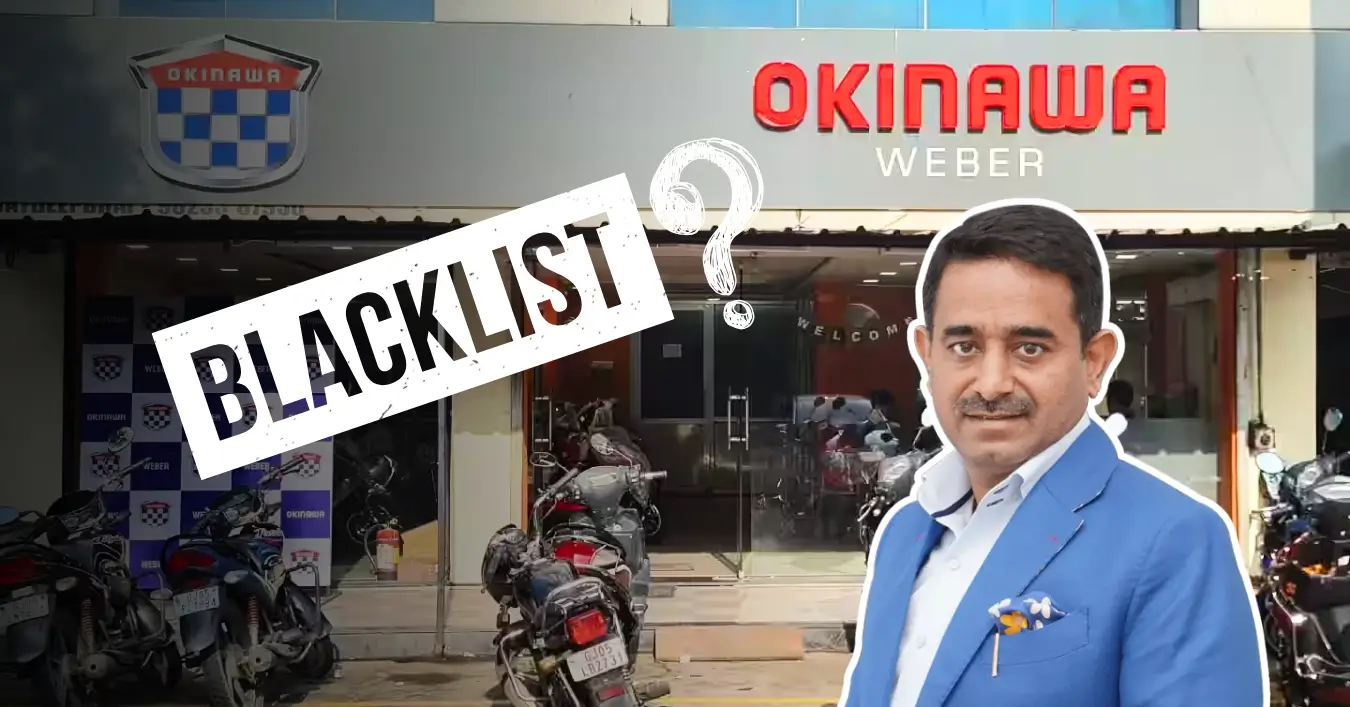
According to a report by LiveMint, The company has reportedly not paid salaries to its employees for several months this year. Some dealers have also complained that they have received vehicles with missing parts. Recently, there were reports in the market that Okinawa may be blacklisted from all central schemes for violating FAME-II guidelines.
Okinawa Autotech, one of the top electric two-wheeler manufacturers in India, could soon be blacklisted from all of the upcoming schemes in the EV ecosystem.
Okinawa has already been de-registered by the Ministry in October 2023 and it is also facing the possibility of being blacklisted since the government concluded that the company had failed to comply with the mandates of the Faster Adoption and Manufacturing of Electric Vehicles in India, Phase II (FAME-II Scheme) and Phased Manufacturing Program (PMP) Guidelines.
The scheme and guidelines were introduced as an initiative by the government to promote and quicken the adoption of electric vehicles in India.
Manufacturers that avail subsidies under this initiative were required to use at least 50% locally sourced parts for all their registered models in accordance with government-issued guidelines from time to time.
Okinawa Autotech‘s electric scooter was the first in the country to receive the FAME-II subsidy incentive in 2019. However, due to the allegations against the company for noncompliance and violation of guidelines under the scheme, the government initiated proceedings for the repayment of the subsidies previously granted.
These findings proved that Okinawa had failed to meet the mandate that at least 50% of the components of the e-vehicle must be locally manufactured to qualify for the subsidy.
Okinawa Autotech also challenged its 2023 de-registration before a single judge of the Delhi High Court, which is currently pending adjudication.
Meanwhile, the Ministry issued a show cause notice against Okinawa, proposing the plan of blacklisting the company.
Okinawa challenged the show cause notice as well. After a single judge dismissed their challenge, Okinawa filed an appeal before the High Court’s Division Bench.
According to Okinawa, the show cause notice should not have been issued while its challenge to the de-registration was still pending adjudication.
Okinawa believed that the show cause notice was predicated on the de-registration order against it and the alleged violation of the scheme and PMP guidelines.
The EV company highlighted that since the same authority who ordered the de-registration had issued the show cause notice, there was naturally an element of bias against them. It also argued that the authority may have issued the notice with a predetermined mind to blacklist Okinawa.
The Central government denied the allegations of bias as Okinawa is not the only company facing action about the genuineness of their subsidy claims.
In 2022, certain complaints were received by the Ministry of Heavy Industries regarding flouting of the FAME-II guidelines by various original equipment manufacturers (OEMs) registered under the scheme, alleging that they were selling electric vehicles in violation of the domestic manufacturing requirements.
Allegations of engagement in rampant importing of vehicle parts, especially from China, were also made in these complaints.
MHI investigated 13 companies out of which six, Hero Electric, Okinawa Autotech, Ampere Vehicles, Benling India, Amo Mobility, Lohia Auto, and Revolt were found to be noncompliant with the requirement norms.
The Ministry had asked these 6 EV makers to return the incentives wrongly claimed under the scheme earlier and were fined a total of 469 crore.
Out of these manufacturers, Amo Mobility, Greaves Electric Mobility and Revolt returned the subsidy with interest.
However, Hero Electric, Okinawa and Benling did not respond or return the incentives, which in turn led to their consequent de-registration in 2023 itself.
Okinawa, tried to file a petition in the Delhi High Court seeking interim protection from recovery of dues.
The court explained that granting interim protection to Okinawa due to cash crunch would set a bad example, given that other firms facing similar situations have complied with the government’s order, dismissing Okinawa’s plea for interim relief.
The government also said that Okinawa should not be granted interim relief as they have ‘acknowledged’ that they have ‘violated the scheme’. Source
Okinawa then moved to court to file a petition in the Delhi High Court seeking a restraining order against the government’s order to recover the claimed incentives which is still pending adjudication.
The next step by the MHI would be debarment from all schemes of the Ministry, which has already been done for Hero Electric and Benling India. Okinawa has still not been debarred because they were present in the court proceedings.
The final step by the government would be blacklisting from all schemes under the Government of India. That has not happened so far because it is a long step-by-step process and it requires the approval of the Ministry of Finance. The Ministry has not approved debarment from all the schemes for any of these firms as of yet.
This post was last modified on October 26, 2024 3:12 pm
Summary: Bengaluru-based EV startup Simple Energy has raised $10 million in a bridge round led by existing investors. The funds…
Kinetic India marked a major milestone in the country’s clean mobility transition today as its battery arm, Range-X, rolled out…
Montra Electric, the clean mobility brand of the Murugappa Group, has unveiled its state-of-the-art electric heavy commercial vehicle (eHCV) manufacturing…
The festive season in India is always considered the right time for new purchases — whether it’s gold, gadgets, or…
Ultraviolette Automotive, the Bengaluru-based electric mobility startup behind the F77, has unveiled its most ambitious motorcycle yet: the X47 Crossover.…
The festive season is always a time of high demand, and Montra Electric is making sure no customer has to…
This website uses cookies.